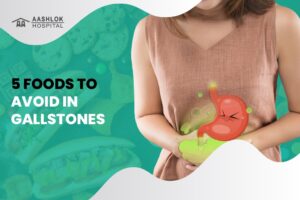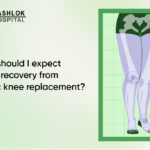5 Foods to Avoid in Gallstones

Table of Content
- What are Gallstones?
- What are Gallstones Symptoms and Causes?
- 5 Food to Avoid If You Have Gallstones
- How Does a High-Fiber Diet Benefit Those with Gallstones?
- Conclusion
- FAQs
Gallstones are stones that can be tiny or large that are formed inside our gallbladder. They can be as tiny as grain or as large as a tennis ball. The Gallbladder is a small pouch-shaped organ that resides just under your liver. Its primary function is to store bile, which is a fluid that your liver produces to break down fatty foods that you eat. Gallstones are hardened deposits of calcium, bilirubin, cholesterol, and digestive fluids that form in your gallbladder. Gallstones cause irrigation to your gallbladder, and if they are bigger ones, they can also cause pain. If you are not maintaining a proper diet, you can experience pain and discomfort if you have gallstones. The exact causative agents of gallstones are unknown, and there is a strong link between your diet and the development of the painful condition. That’s why doctors recommend that you avoid these five foods all year long.
Also Read : Comprehensive Guide to Gallstones Treatment
What are Gallstones?
Cholesterol gallstones are mineral formations that form in the gallbladder and have a solid stony texture. The gallbladder on its own has the duties of storing bile; a digestive fluid that is produced in the liver. Bile is needed in the digestion and assimilation of fats in the intestine in particular in the small part of the intestines. However, there are certain types of foods to avoid with gallbladder stones that can prevent them from occurring.
What are Gallstones Symptoms and Causes?
There are many reasons for gallstone formation. However, most people having these stones do not experience any symptoms for several years so they are unaware about it. But when this stone blocks a bile duct it leads to serious and unbearable pain. If you have such immense pain and suspect you have gallstones, book an appointment at Aashlok Hospital now.
Symptoms
The symptoms of gallstones could be mild or severe depending on the size of the stone and its contents. The most common symptoms of gallstones include:
1. Biliary Colic (Gallbladder Attack)
The main sign of gallstone formation is biliary colic. This occurs when a gallstone covers up the bile duct and prevents the free outflow of bile from the gallbladder. This might result in discomfort or acute pain in the back or right shoulder and the duration of pain may be felt for a few minutes to some hours.
2. Nausea and Vomiting
A patient suffering from a blocked bile duct, due to gallstone formation, tends to suffer from nausea and vomiting as such conditions weaken the digestive system. Under such circumstances, a gallstone diet is recommended which includes consuming easily digestible food items. Foods to avoid with gallbladder stones are items that are high in fats like oily fish.
3. Fever with Chills
When one is afflicted by fever with chills, the gallstones may lead to cholecystitis which is an infection in the gallbladder. There are several forms of cholecystitis like acute cholecystitis and gangrenous cholecystitis. They usually develop when there is stagnation of bile in the gallbladder that has led to bacterial growth. This condition requires urgent medical intervention, since failure to do so, can lead to complications like rupture of the gallbladder. During that phase, you should be careful about the foods to avoid with gallbladder stones for better health.
Also Read : Exercise for Gall Bladder Stone: A Complete Guide for Pain Relief
Causes
Some of the key causes of gallstones are mentioned below:
1. Cholesterol Deposits in the Bile
The prominent risk factors for cholesterol-containing gallstones include increased cholesterol in the bile for which a gallstone diet should be effectively followed. Cholesterol that has been expelled back into the liver is often emulsified by the bile which in most cases, contains strong reagents. However, when cholesterol is released into the liver and forms in excess that can dissolve in the bile, it may assume a crystalline form and grow into gallstones with time. This implies that this imbalance can be due to consumption of excessive fatty food, obesity, and some types of metabolic diseases. Hence, the type of foods to avoid with gallbladder stones include those items that have a high cholesterol level.
2. High Bilirubin Levels
Gallstones are most often seen in cases where there is bilirubin pigment in bile. The liver metabolizes a substance called bilirubin which is derived from the breakdown of a protein hemoglobin contained in red blood cells. Certain diseases, including liver cirrhosis, blood diseases like sickle cell anemia, and conditions like bile duct infections, cause an increased amount of bilirubin production by the liver. These contribute to the formation of pigment stones. In such scenarios, the fatty foods to avoid with gallbladder stones would be high-in-fats animal protein like red meat and dairy products. Food items made with flour and alcoholic beverages should also be avoided.
3. Age, Gender, and Hormones
Gallstones are more prevalent in older individuals and the risk starts increasing with age. Hormonal factors make women more vulnerable to gallstones than males. The foods to avoid with gallbladder stones also vary with the age of the patients. To avoid the risks of gallstone, one can pay a hassle-free visit to Aashlok Hospital. They have experienced gastroenterologists who curate customized treatment plans according to your health needs.
Also Read : Gallstones- a stone to be removed from your body
5 FOOD TO AVOID IF YOU HAVE GALLSTONES
- Fatty Meat: You can always choose red meat with less fat or lean meat like chicken or turkey with no skin on it. The skin has more fat and they should be avoided if you have a gallstone. Try not to fry your meat; instead, boil, bake, or grill your meat. Try to avoid processed meat like hot dogs, cold cuts, fish sticks, sausages, and canned meats (not including fish) and contribute to gallstones.
- High Fat Dairy: If you love having milk, cheese, curd, yoghurt, or any dairy products, you don’t need to cut them out when you have gallstones. Instead, use low-fat dairy products; low-fat milk, yoghurt, cream cheese, and sour cream are options when you’re grocery shopping. You just have to be smart in choosing your eateries.
- White Flour Product: White bread, white pasta, and all-white flour products are not rich in fibres. So use whole grain products. Have oats for breakfast and use brown rice, multigrain bread, and pasta for a rich fibrous diet. Refrain the use of processed carbohydrates as they increase the level of insulin, which increases the cholesterol levels in your body.
- Soft Drinks: Sugar and carbonation in soft drinks hamper the normal function of the gallbladder. Water is your best beverage option for its many health benefits and because it detoxifies impurities that impact your gallbladder. Stay hydrated and drink enough water to clear the impurities. Go for juice instead of soft drinks. Or buy a dispenser that allows you to make your carbonated water and control the amount of sugar in your soda.
- Sugary desserts: Most of the time, your dinner is incomplete without having a sugar-filled cake or any sweet sugary dessert. But you must know that these desserts have fat and calories that can harm your gallbladder. Instead, choose fruit and yoghurt, non-dairy frozen desserts, fruit pies, or light cookies.
Also Read : Benefits of Following a 7 Day Gallbladder Diet Menu
How Does a High-Fiber Diet Benefit Those with Gallstones?
Fibre has an important role to play in ensuring a healthy digestive process. It facilitates the non-stop movement of food through the intestines, thus preventing the excessive concentration of bile. A high-fiber gallstone diet not only helps with the medical condition of the patients suffering from gallstone formation but also prevents its occurrence. The consumption of fiber-containing foods helps to fight obesity, which is one of the factors contributing to gallstone formation.
Also Read : FIVE SAFE TIPS FOR THE PREVENTION OF GALLSTONE
Conclusion
Now that you are aware of what gallstones are and the factors that lead to the formation of gallstones, it will aid you in early detection and treatment. Keeping track of foods to avoid with gallbladder stones, following a strict diet, and keeping a check on your weight, can help you in quick recovery.
To your rescue, the gastroenterologists of Aashlok Hospital are always available with their high-quality professional care and healthcare services. The multi-specialty hospital is equipped with the latest advanced technologies and expert medical staff to cater to your medical needs for a smooth recovery.
FAQs
1. What is the best food to eat if you have gallstones?
A patient suffering from gallstone discomfort should consume high-fiber food items, like fruits and leafy vegetables that are high in antioxidants, minerals, and vitamins. For example beans, citrus fruits, tomatoes, dark leafy greens. Whole grains like wheat, oats, brown rice, and lean proteins with low-fat content like chicken, less oily fish, and low-fat dairy products like skimmed milk and low-fat yogurt should be consumed.
2. What should you not drink with gallstones?
Gallstone patients should strongly stay away from drinking alcoholic beverages, high-sugar content carbonated drinks like Coke and Pepsi, and caffeinated drinks like coffee.
3. What should not eat in a gallbladder stone?
Foods to avoid with gallbladder stones include products that are high in fat content, like red meat and oily fish and dairy products like full-cream milk or ice cream. Highly processed food like white bread or bakery items made with maida and spicy, oily junk food like French Fries and samosas should be avoided by gallstone patients.
4. What food melts gallstones?
There is no such proof of any food that can dissolve gallstones but yes, consumption of high-fiber food like oats, whole grain wheat, and brown rice, and eating citrus fruits like oranges and lemon, can reduce the chances of occurrence of gallstones.








Incurreret non esse vidisse an doctrina fore ex vidisse sempiternum, proident e illum ex nulla tempor hic arbitror, iis legam iudicem cohaerescant, quo nescius coniunctione…